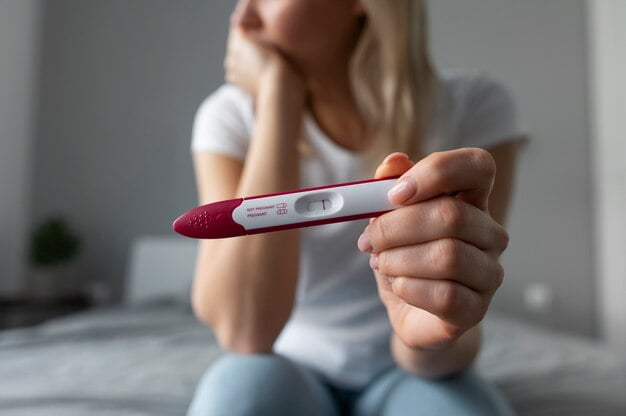
Contents
- 1 Introduction
- 2 Understanding Yeast Infections
- 3 Yeast Infections and Pregnancy
- 4 Can a Yeast Infection Affect a Pregnancy Test?
- 5 The Connection Between Yeast Infections and False Positives
- 6 Ensuring Accurate Pregnancy Test Results
- 7 Home Remedies for Yeast Infections During Pregnancy
- 8 Medical Treatment for Yeast Infections in Pregnant Women
- 9 Preventing Yeast Infections During Pregnancy
- 10 The Importance of Consulting a Healthcare Professional
- 11 Conclusion
- 12 FAQs
Introduction
Pregnancy tests are a crucial tool for women who are trying to conceive or those who may have concerns about unintended pregnancy. However, it’s common for women to wonder if certain health conditions or infections, such as yeast infections, can impact the accuracy of these tests. In this article, we will explore the relationship between yeast infections and pregnancy tests and provide information to help you understand how these factors may or may not be related.
Understanding Yeast Infections
Before we delve into the connection between yeast infections and pregnancy tests, it’s important to grasp what a yeast infection is. Yeast infections are fungal infections that can affect various parts of the body. The most common type is vaginal yeast infection, caused by the overgrowth of the Candida fungus. These infections are characterized by symptoms like itching, burning, and unusual discharge.
Yeast Infections and Pregnancy
3.1 Common Symptoms
During pregnancy, women experience numerous bodily changes. Some symptoms of yeast infections, such as itching or discomfort, can overlap with pregnancy symptoms, making it essential to understand the differences to address these issues appropriately.
3.2 Diagnosis and Testing
Proper diagnosis of a yeast infection is crucial. A healthcare professional may perform a vaginal examination or order a lab test to confirm the infection. It’s important to communicate any symptoms to your healthcare provider during your prenatal care visits.
Can a Yeast Infection Affect a Pregnancy Test?
4.1 How Pregnancy Tests Work
Pregnancy tests work by detecting the presence of human chorionic gonadotropin (hCG) hormone in the urine. This hormone is produced during pregnancy and is the key indicator of whether you are pregnant or not.
4.2 Factors That Can Affect Pregnancy Tests
Several factors can potentially affect the accuracy of pregnancy tests. These include the timing of the test, the sensitivity of the test kit, and certain medications. However, yeast infections are not known to directly interfere with the detection of hCG.
The Connection Between Yeast Infections and False Positives
5.1 Vaginal Yeast Infections
Vaginal yeast infections primarily affect the genital area, and their symptoms should not lead to a false-positive pregnancy test.
5.2 Oral Yeast Infections
Oral yeast infections are caused by the same Candida fungus but affect the mouth and throat. These infections are unrelated to hCG and should not influence pregnancy test results.
Ensuring Accurate Pregnancy Test Results
To ensure accurate pregnancy test results, it is essential to follow the test kit instructions carefully and perform the test at the recommended time. If you have concerns about the accuracy of your results, consider consulting your healthcare provider for further guidance.
Home Remedies for Yeast Infections During Pregnancy
Pregnant women should avoid self-treatment of yeast infections with over-the-counter remedies. Consult a healthcare professional for safe and effective treatment options during pregnancy.
Medical Treatment for Yeast Infections in Pregnant Women
Healthcare providers can prescribe safe antifungal medications for treating yeast infections during pregnancy. It’s important to follow their recommendations to avoid complications.
Preventing Yeast Infections During Pregnancy
Prevention is key. To reduce the risk of yeast infections during pregnancy, maintain good hygiene, wear breathable clothing, and avoid excessive sugar intake. Your healthcare provider can provide additional guidance on prevention strategies.
The Importance of Consulting a Healthcare Professional
If you suspect a yeast infection or have concerns about your pregnancy test results, don’t hesitate to consult a healthcare professional. They can provide you with the appropriate guidance and treatment options.
Conclusion
In conclusion, yeast infections, whether vaginal or oral, are not known to directly affect the accuracy of pregnancy tests. However, if you have concerns about your test results or experience symptoms of a yeast infection during pregnancy, it’s crucial to consult with a healthcare provider for proper evaluation and guidance.
FAQs
1. Can a yeast infection cause a false-positive pregnancy test result? No, yeast infections are not known to cause false-positive pregnancy test results.
2. Can a yeast infection cause a false-negative pregnancy test result? Yeast infections are not associated with false-negative pregnancy test results.
3. Can I use over-the-counter yeast infection treatments during pregnancy? It is not recommended to self-treat yeast infections during pregnancy. Consult your healthcare provider for safe treatment options.
4. How can I prevent yeast infections during pregnancy? To prevent yeast infections during pregnancy, maintain good hygiene, wear breathable clothing, and follow your healthcare provider’s guidance on prevention.
5. When should I consult a healthcare professional if I suspect a yeast infection during pregnancy? If you suspect a yeast infection or have concerns about your pregnancy test results, it’s important to consult a healthcare professional promptly for proper evaluation and guidance.




